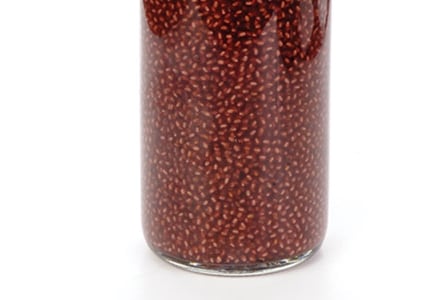
Yes, some bacteria can be healthy! Probiotics can help to rebalance our gut bacteria and protect our digestive systems and immune systems.
Hippocrates said, “all disease starts in the gut,” and this couldn’t be more true. Seventy percent of our immune system is located in our gut, and its smooth running is reliant on the balance of our good and bad bacteria. That’s where probiotics play a very important role.
Many different strains
There are about a thousand different species, and more than 15,000 different strains of bacteria inside us, weighing in at an impressive 2.2 lb (1 kg).
However, it’s very easy for these bacteria to become imbalanced due to stress, sleep, age, medication, alcohol, and diet. When this happens, the toxic “bad” bacteria thrive, outnumbering the good bacteria, which can lead to disease. Probiotics repopulate our good bacteria and neutralize the bad.
What are probiotics?
The word “probiotic” comes from the Greek words pro bios which mean “for life,” and when we look at the expanding research we can see why this is such an apt name. Study after study has produced promising results suggesting probiotics may be beneficial in protecting us from illness, as well as helping to reduce or abate symptoms of certain medical conditions.
What can probiotics do?
The list is long when it comes to the potential benefits of probiotics. Researchers continue to explore the many different types and strains of probiotics and the myriad ways in which they might help improve our health.
Improve digestion
Digestion is the cornerstone of good health, therefore anything we can do to improve our digestion is a good thing. Probiotics help do this in a variety of ways.
- They can keep our digestive system’s pH in check.
- They help neutralize harmful bacteria in our gut that can create toxins in our system.
- They may enhance our mineral absorption, in particular calcium, phosphorus, and magnesium.
- They may biosynthesize B vitamins, vitamin K, folate, and short chain fatty acids.
By doing all this they help the body conserve energy and reduce the steps in the laborious task of attempting to digest food and absorb nutrients if our systems are already overburdened from poor diet and lifestyle choices.
Treat irritable bowel disease and diarrhea
The role that gut bacteria play in the induction and relapse of irritable bowel diseases (IBD) such as Crohn’s and ulcerative colitis, has received a great deal of attention.
Evidence suggests gut bacteria play a crucial role in the genesis of IBD as well as the exacerbation of it. In fact, a decrease in gut bacteria biodiversity has been found in many IBD patients, and studies have shown probiotics may help to regulate—even incite remission—in some IBD cases.
Additionally, probiotics have been used to help prevent and control antibiotic-related diarrhea, prevent travellers’ diarrhea, and treat diarrhea-associated diseases in children caused by rotaviruses.
Reduce cholesterol
In 1974, scientists observed extremely low incidences of cardiovascular disease of African Masai and Samburu warriors whose regular diet included fermented milk. Today, exciting studies are evolving in the field of cholesterol reduction through the use of probiotics, in particular via the use of fermented dairy products containing lactic acid bacteria.
Studies have shown that probiotics, when taken orally, may reduce cholesterol levels. In one study, participants consumed 2 cups (200 g) of yogurt containing L. acidophilus daily. The results showed a significant reduction in cholesterol levels compared to the placebo group.
Prevent cancer
Promising lab studies suggest that probiotics may be able to play a role in cancer prevention, specifically colon cancer. And in one lab study of probiotics and cancer, milk fermented with a specific Lactobacilli probiotic delayed breast tumour cell growth.
Strengthen our immune system
Probiotics may also activate our immune system by increasing the beneficial bacteria in our guts, which decreases harmful pathogens by competing for their receptor sites and nutrients. This in turn decreases inflammation and stimulates our immune cells to attack the bad bacteria.
Protect the liver and intestinal tract
There is a symbiotic relationship between the liver and intestinal tract. When one is healthy the other has a better chance of being healthy too. People who have liver disease more often than not exhibit imbalanced intestinal flora, which can relate to the development and exacerbation of the disease.
An imbalance of good versus bad bacteria in the intestinal tract can result in serious liver diseases such as cirrhosis of the liver, nonalcoholic fatty liver disease, alcoholic liver disease, and even liver cancer. Probiotics have shown evidence of reducing symptoms in and improving different types of liver diseases. Compelling evidence continues to emerge suggesting that probiotics play a large role in maintaining a healthy liver.
How to get your probiotics
A healthy gut can be maintained with a variety of probiotic foods, says registered holistic nutritionist, Lorene Sauro. And there are many delicious options to choose from, including
- yogurt (look for “live and active cultures” on the label)
- pickled vegetables
- kefir
- miso
- kombucha
- soy sauce
- tempeh
Sauro adds that if you’re taking a course of antibiotics it’s important to also take a course of probiotics at the same time and for at least two weeks after. She suggests a high quality probiotic supplement that has at least 30 billion colony forming units (CFUs) or higher (anywhere up to 100 billion) and contains at least eight to 10 different strains of bacteria.
Consuming probiotics—either as food or as a supplement—on a daily basis is one step toward better health.

